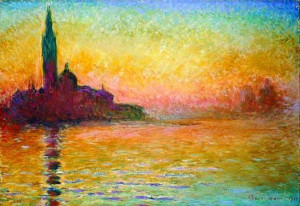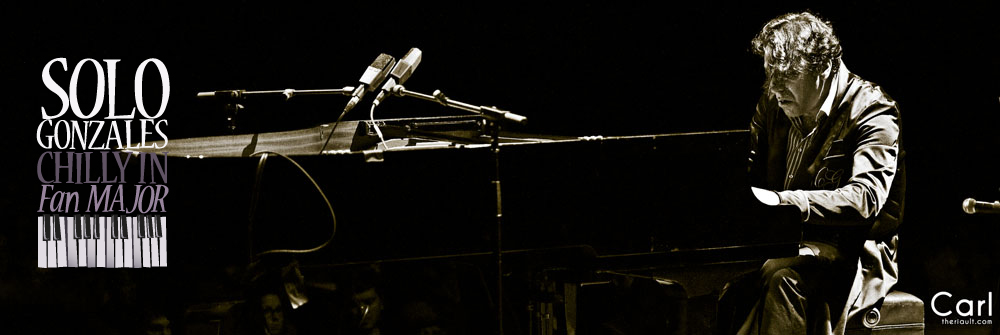 There’s an obvious, but almost always overlooked aspect of classical music: nearly all classical musicians are, essentially, a cover band in the sense that they are simply re-interpreting music that someone else wrote. Most listeners don’t have the training and experience to hear a Chopin Etude and say whether it’s Pollini or Lang Lang playing (interpreting). The vast majority of classical musicians have never published a single original composition. Even Glenn Gould, with all his performance and interpretive brilliance, never published a ‘hit’ – just a few mildly interesting pieces in his youth.
There’s an obvious, but almost always overlooked aspect of classical music: nearly all classical musicians are, essentially, a cover band in the sense that they are simply re-interpreting music that someone else wrote. Most listeners don’t have the training and experience to hear a Chopin Etude and say whether it’s Pollini or Lang Lang playing (interpreting). The vast majority of classical musicians have never published a single original composition. Even Glenn Gould, with all his performance and interpretive brilliance, never published a ‘hit’ – just a few mildly interesting pieces in his youth.
Contrast this with music in the pop domain. Cover bands are essentially relegated to a ‘tribute’ act, aping the Beatles’ or Elvis’ look and sound. There’s no question that the occasional re-make also flies to the top of the charts, but that’s the exception rather than the rule – the vast majority of pop artists are expected to write and/or perform original music, as opposed to ‘interpreting’ a past composition or hit. There are also artists who consistently rely on songwriters or producers to supply the music (and sometimes words) to their songs, but in these cases, the songs become associated with the artist, as opposed to becoming a more general ‘standard’.
Jazz seems to be split quite evenly, with even the most modern bands often playing a few ‘standards’ during a set. There’s a certain degree of listener ‘comfort’ in knowing a song, combined with the unique (and often extremely) varied interpretation on standards that many Jazz bands appear to embrace. Jazz musicians live in ‘limbo’ to some degree – many Jazz musicians and composers are constantly looked to for innovation, yet the same audience also demands Jazz standards. A Jazz-themed artist such as Harry Connick Jr. may even achieve great success with an album of covers, only to find out that the same audience has no appetite for his original compositions. The same applies for ‘crooners’ such as Frank Sinatra and Michael Bublé: they are essentially ‘cover’ artists, even though there are a number of hits written specifically for them that have become their « signature songs » (Mr. Bublé has penned a few originals – none have become hits).
There are a few things to notice about the originals vs. covers debate:
Old = Dead
On a continuum, the smallest output of new material is related to the oldest genre. Less new classical is composed than Jazz, and so on. Once a musical field has been relatively ‘filled’ with all manner of permutations, the best of the best is saved for future generations, and the rest is filtered out. Once we’ve heard the ‘standards’, it becomes challenging for new compositions to become a standard, since people instinctively compare to the standards.
Great Artists Steal
‘Originals’ is a funny word. The music of today has built on the work of countless others, and it could be argued that only in very rare circumstances will we hear something truly original. There is no shortage of creativity, but we are all ‘victims ‘of the age we are born in. We could not have experienced Mozart playing live, nor can we appreciate the music of the year 2200. Music is for our enjoyment, and we should seek out artists we enjoy and encourage others to do the same.
Connections
Regardless of the type of music (classical vs. pop; covers vs. originals), the best artists have something to say. It could be the use of new technology on an old standard, or old technology in a new composition – it boils down to the individual entertainer being able to connect with an audience. That could be Lang Lang inspiring an 8-year old pianist, or Skrillex enthralling an octogenarian.
In his own words, Gonzales is a romantic – in the classical sense of the word: appealing to our imagination, evoking emotion and atmosphere within ourselves. On the rare occasion that Gonzales performs a cover, it’s usually a small snippet, or (in the case of the Guinness World record performance) – a solo piano approach to a modern pop song. Gonzales composes and performs his own music – a trait associated with pop music. His tools are highly refined and perfected to elicit an emotional response – piano, violin, viola, and cello have all evolved over hundreds of years and are viscerally and visually pleasing. It may take a couple of hundred years for synthesizers to reach the same level of perfection.
Suppose Gonzales took the opposite approach – composed his music, then programmed it into a computer and used a bank of synthesizers to re-create the performance. There is certainly a great deal of skill in composing the song, programming, arranging, and so on. For live performances, Gonzales would press a few buttons, and sit back in a chair while we listened to his composition (actually, Vince Clarke did just that for some early Yazoo performances in an almost Dadaist statement on modern music). Even if Gonzales chose classical instruments, there are sample libraries and synthesizers that could stand in for an entire orchestra with very few listeners being able to discern between a computer and live performance. Film composers use the sample libraries all the time; to great cinematic effect, but the same machines are sorely lacking for live performance. What’s missing is the struggle – we can imagine how much work the music was to create, but we don’t see the musicians struggling with their instruments to achieve the same level or perfection.
Comparing Gonzales’ music or performance to a classical music performance is misguided at best. The temptation is understandable, but it’s akin comparing the work of impressionistic painters to classical painters – same brushes, same paint, same canvas, but wildly different results. Structurally, Gonzales music is closer to pop or Jazz, with some compositions lining up with electronica. When you listen to « Prelude to a Feud », imagine a synth line running up the octaves – it perfectly fits, and yet, if it were actually released as a synth-driven song, it would lack the struggle of a human trying to be a sequencer, which makes all the difference between compositions that hit us emotionally and the latest earworm that keeps the music machine rolling along.
Gonzales’ « New Romantic » revolution brings new life to the tools that classical musicians have relied on for centuries in the name of pop and modern ears. Whether it’s through his on-stage mix of humour and music, or within Solo Piano, Ivory Tower, or Chambers, Gonzales always has something important to say.
